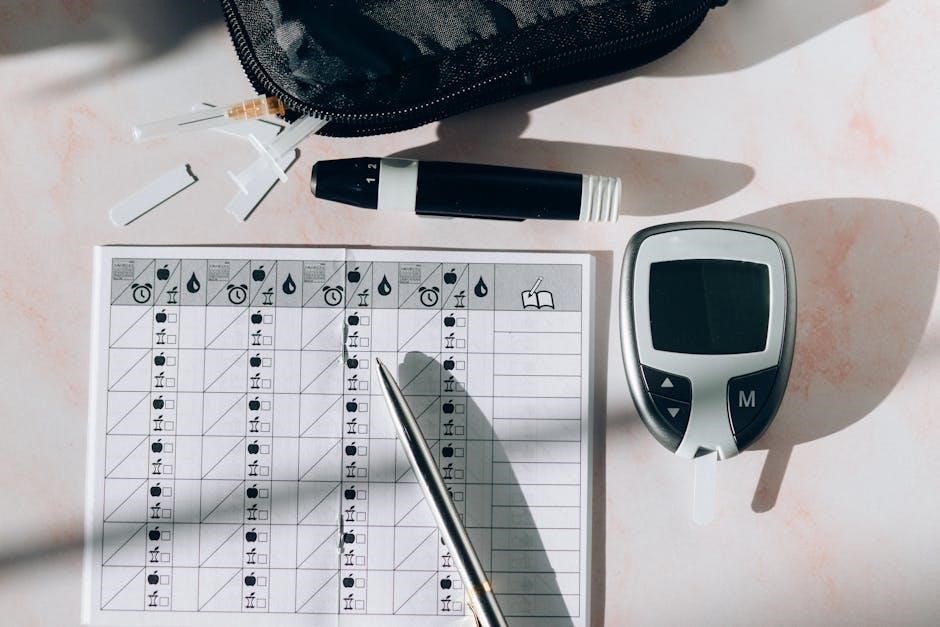Overview of the Dr. Unwin Diet
Dr. Unwin’s diet sheet emphasizes reducing starchy carbohydrates and sugary foods, focusing on healthy fats, proteins, and green vegetables to manage blood sugar and improve overall health.
Dr. Unwin’s diet focuses on a low-carbohydrate approach, designed to help manage Type 2 diabetes and improve overall health. It emphasizes reducing starchy carbs and sugary foods, which are seen as concentrated sugars, and eliminating “White Stuff” like bread, pasta, and rice. The diet encourages replacing these with healthy fats, proteins, and green vegetables to balance blood sugar levels. It also promotes portion control and mindful eating, avoiding hidden carbs in processed foods. This approach aims to minimize the long-term damage of high blood sugars, offering a sustainable way to manage diabetes and support weight loss and heart health.
Importance of the Diet Sheet for Diabetes Management
Dr. Unwin’s diet sheet is a vital tool for managing Type 2 diabetes by focusing on blood sugar control through dietary changes. By eliminating high-carb and sugary foods, it helps reduce insulin resistance and stabilize glucose levels. The diet sheet provides clear guidance, making it easier for individuals to make informed food choices. It also highlights the importance of healthy fats and proteins, which help satiate hunger and regulate blood sugar swings. Many patients have reported significant improvements, including reduced medication needs and improved HbA1c levels, showcasing its effectiveness in managing diabetes and promoting long-term health benefits.

Core Principles of the Dr; Unwin Diet
Dr. Unwin’s diet focuses on a low-carb, low-sugar approach to reduce insulin resistance and promote fat burning for energy. It emphasizes healthy fats, proteins, and vegetables to support weight loss and blood sugar control while minimizing hunger and improving overall metabolic health.
Reducing Starchy Carbohydrates
Dr. Unwin’s diet prioritizes reducing starchy carbohydrates, such as bread, pasta, rice, and potatoes, to minimize blood sugar spikes and insulin resistance. By eliminating these high-carb foods, the body shifts from relying on glucose to burning fat for energy, promoting weight loss and improved blood sugar control. This approach also helps reduce hunger and cravings, making it easier to adhere to the diet. Replacing starchy carbs with low-carb vegetables, healthy fats, and proteins supports overall metabolic health and helps manage diabetes effectively. This fundamental change in carbohydrate intake is central to the diet’s success in achieving sustainable health benefits.
Eliminating Sugary Foods and Drinks
Dr. Unwin’s diet emphasizes the removal of sugary foods and beverages to stabilize blood sugar levels and reduce insulin spikes. Sugary items, such as candy, cakes, and sweetened drinks, are high in empty calories and contribute to weight gain and metabolic issues. By eliminating these, individuals can better control their glucose levels and minimize cravings. The diet encourages replacing sugary drinks with water, herbal teas, or unsweetened almond milk. Cutting out sugar also helps reduce inflammation and improves overall health, making it a critical step in managing diabetes and achieving long-term well-being on the Dr. Unwin diet.
Focus on Healthy Fats and Proteins
Dr. Unwin’s diet prioritizes healthy fats and proteins to promote satiety and stabilize blood sugar levels. Sources include avocados, nuts, seeds, olive oil, fatty fish, eggs, and meat. These foods provide essential nutrients and help reduce carbohydrate cravings. By focusing on fats and proteins, the diet ensures sustained energy and supports weight management. This approach also minimizes insulin spikes, making it ideal for diabetes control. Incorporating these foods helps maintain muscle mass and overall health, aligning with the diet’s goal of improving metabolic well-being through nutrient-dense choices.
Incorporating Green Vegetables and Salads
Green vegetables and salads are cornerstone components of Dr. Unwin’s diet, offering essential vitamins, minerals, and antioxidants. Leafy greens like spinach, kale, and broccoli are rich in fiber, which aids digestion and blood sugar regulation. Salads with mixed greens, cucumbers, and tomatoes provide hydration and satiety. These foods are naturally low in carbohydrates, making them ideal for managing diabetes. Dr. Unwin encourages generous portions of green vegetables to balance meals and support overall health. Pairing salads with healthy fats like olive oil or avocado enhances nutrient absorption, further benefiting those following the diet.
Key Foods to Avoid
Dr. Unwin’s diet avoids high-carb and sugary foods; Key foods to avoid include:
- Sugary foods and drinks
- White bread, pasta, rice
- Processed carbs
White Stuff: Bread, Pasta, and Rice
Dr. Unwin’s diet emphasizes avoiding “white stuff” like bread, pasta, and rice due to their high carbohydrate content. These foods are rapidly digested, causing sharp spikes in blood sugar levels, which can be detrimental for individuals with diabetes. Refined grains lack essential nutrients and fiber, leading to energy crashes and increased hunger. By eliminating these foods, individuals can better control their blood sugar and improve insulin sensitivity. Replacing them with low-carb alternatives like vegetables and healthy fats supports sustained energy and weight management, aligning with the diet’s goals of promoting long-term health and glucose stability.
High-Sugar Foods and Beverages
High-sugar foods and beverages are strictly limited on Dr. Unwin’s diet due to their detrimental impact on blood sugar control. Sugary items, such as candies, desserts, and sweetened drinks, cause rapid spikes in glucose levels, worsening insulin resistance. Regular consumption can lead to energy fluctuations and increased diabetes complications. The diet recommends eliminating these foods to stabilize blood sugar and promote better metabolic health. Instead, opt for naturally sweet alternatives like berries or flavored water. Avoiding hidden sugars in processed foods is also crucial for long-term glucose management and overall well-being.
Refined and Processed Carbohydrates
Refined and processed carbohydrates, such as white bread, pasta, cereals, and pastries, are high in empty calories and low in nutrients. These foods cause rapid spikes in blood sugar, making them unsuitable for diabetes management. The Dr. Unwin diet advises eliminating or significantly reducing these items to maintain stable glucose levels. Instead, focus on whole, unprocessed foods like vegetables, lean proteins, and healthy fats. This approach helps improve insulin sensitivity and supports overall metabolic health. Avoiding refined carbs also reduces inflammation and promotes sustainable weight loss, aligning with the diet’s goals for better blood sugar control and long-term well-being.

Recommended Foods on the Diet
Focus on healthy proteins, low-carb vegetables, full-fat dairy, nuts, seeds, and healthy oils like olive and coconut oil for sustained energy and better blood sugar control.
Healthy Proteins: Eggs, Fish, and Meat
Eggs, fish, and meat are cornerstone proteins in Dr. Unwin’s diet, providing essential nutrients and satiety. Eggs are versatile and rich in vitamins, while fish like salmon and mackerel offer omega-3 fatty acids for heart health. Opt for wild-caught or grass-fed options to avoid unhealthy additives. Meat, such as beef, chicken, or pork, should be lean or fattier cuts, depending on preference, but always free from added sugars or sauces. These proteins help stabilize blood sugar levels and promote a feeling of fullness, making them ideal for managing diabetes and supporting overall health.
- Eggs: Rich in vitamins and versatile for meals.
- Fish: High in omega-3s for heart and brain health.
- Meat: Choose lean or fatty cuts, avoiding processed varieties.
Low-Carb Vegetables and Their Benefits
Non-starchy vegetables are a cornerstone of Dr. Unwin’s diet, offering fiber, vitamins, and minerals without raising blood sugar. Leafy greens like spinach, kale, and broccoli are rich in nutrients and antioxidants. Vegetables such as cauliflower, zucchini, and asparagus are excellent low-carb alternatives to starchy options. These foods support digestion, reduce inflammation, and provide essential nutrients for overall health. Incorporating a variety of colorful vegetables ensures a balanced diet while helping to stabilize blood glucose levels.
- Leafy greens: Spinach, kale, and broccoli.
- Low-carb options: Cauliflower, zucchini, and asparagus.
- Benefits: Fiber, antioxidants, and blood sugar control.
Full-Fat Dairy Products
Full-fat dairy products, such as cheese, whole milk, and yogurt, are encouraged in Dr. Unwin’s diet. They provide essential nutrients like vitamins A and D, calcium, and healthy fats. These fats are crucial for hormone production and satiety, helping with portion control. Full-fat dairy supports overall health without raising blood sugar levels, making it an ideal choice for diabetes management. Incorporating these products promotes a balanced diet and complements the diet’s focus on nutrient-dense foods.
- Cheese, whole milk, and full-fat yogurt are recommended.
- Rich in vitamins A and D, calcium, and healthy fats.
- Supports hormone production and satiety.
Nuts and Seeds as Healthy Snacks
Nuts and seeds are excellent snacks on Dr. Unwin’s diet, offering healthy fats, protein, and fiber. They help stabilize blood sugar and provide a feeling of fullness. Almonds, walnuts, chia seeds, and flaxseeds are great choices due to their high nutritional value. Portion control is key, as they are calorie-dense. Avoid flavored or roasted varieties to reduce added sugars and oils. These snacks support weight management and overall health while fitting the diet’s low-carb, high-fat principles.
- Rich in healthy fats, protein, and fiber.
- Help stabilize blood sugar and promote satiety.
- Choose unflavored and unroasted options.
- Portion control is essential due to calorie density;
Meal Planning and Portion Control
Meal planning and portion control are crucial for managing blood sugar and weight. Dr. Unwin’s diet emphasizes organizing meals, balancing nutrients, and avoiding overeating to promote healthier eating habits and sustainable weight loss.
Breakfast Ideas for a Low-Carb Diet
Starting your day with a nutritious, low-carb breakfast is essential. Consider options like scrambled eggs with avocado, smoked salmon, or spinach. A vegetable omelet with mushrooms and cheese is also a great choice. For a simpler option, try a bowl of Greek yogurt with a handful of nuts or seeds, ensuring they are sugar-free. Dr. Unwin recommends avoiding cereals and toast, focusing instead on protein and healthy fats to maintain energy levels and blood sugar balance throughout the morning.
Lunch and Dinner Suggestions
For lunch and dinner, focus on protein-rich foods like grilled fish, meat, or eggs, paired with low-carb vegetables. A salad with mixed greens, avocado, and olive oil dressing is an excellent option. Roasted or stir-fried vegetables such as broccoli, cauliflower, or Brussels sprouts make great side dishes. Consider cauliflower rice or zucchini noodles as low-carb alternatives to traditional sides. Ensure meals are balanced with healthy fats like butter, olive oil, or avocado to keep you satisfied. Portion control is key to maintain weight and blood sugar goals while enjoying flavorful, nutritious meals.

Snacking Options That Fit the Diet
Healthy snacking is essential for maintaining energy levels and adherence to the Dr. Unwin Diet. Opt for nuts and seeds like almonds, walnuts, or pumpkin seeds, which are rich in healthy fats and low in carbohydrates. Hard-boiled eggs, cheese, or avocado slices make convenient and satisfying snacks. Consider veggie sticks such as cucumber, celery, or bell peppers paired with dips like guacamole or sour cream. Always prioritize portion control to avoid overeating. Planning snacks in advance ensures you stay on track and avoid temptation from high-carb or sugary options.

Portion Control Tips for Weight Management
Portion control is vital for weight management on the Dr. Unwin Diet. Start meals with a salad or vegetables to reduce overall food intake. Use smaller plates to visually manage portion sizes. Prioritize protein and healthy fats, as they are more satisfying and reduce carbohydrate cravings. Be mindful of serving sizes, especially for calorie-dense foods like nuts or cheese. Avoid eating straight from packaging to prevent overeating. Plan meals in advance to maintain balance and control. By focusing on quality over quantity, you can achieve sustainable weight loss while adhering to the diet’s principles.

Scientific Evidence and Success Stories
Dr. Unwin’s diet is backed by clinical studies showing improved blood sugar control and weight loss. Patients report significant reductions in HbA1c levels and enhanced overall health outcomes.
Studies Supporting Low-Carb Diets for Diabetes
Dr. Unwin’s research and clinical trials demonstrate that low-carb diets significantly improve blood sugar control and reduce diabetes medications. Studies published in The Lancet and Diabetes, Obesity and Metabolism show that low-carb approaches lower HbA1c levels, enhance insulin sensitivity, and promote weight loss. Patients adopting this diet often achieve remission of type 2 diabetes. These findings align with Dr. Unwin’s diet sheet, which emphasizes reducing starchy carbohydrates and focusing on real, nutrient-dense foods. The evidence supports the diet’s effectiveness in managing and reversing diabetes, making it a highly recommended approach for those seeking to improve their metabolic health.
Real-Life Success Stories from Dr. Unwin’s Patients
Dr. Unwin’s patients have achieved remarkable results following his diet sheet. Many have reported significant weight loss, improved blood sugar levels, and reduced reliance on diabetes medications. Some patients have even reversed their type 2 diabetes entirely. These success stories highlight the diet’s effectiveness in transforming lives. By focusing on real food and eliminating sugary and starchy carbohydrates, individuals have regained control over their health. Dr. Unwin regularly shares these inspiring stories to motivate others to adopt a low-carb lifestyle, demonstrating the profound impact of his approach on both physical and mental well-being.

Long-Term Benefits of the Diet
The Dr. Unwin Diet offers sustainable long-term benefits, helping individuals adopt a healthier lifestyle. By focusing on real, nutrient-dense foods, participants often experience improved blood sugar control, reduced blood pressure, and enhanced cholesterol levels. The diet promotes weight management, reducing the risk of heart disease and other chronic conditions. Over time, many users develop better eating habits, leading to long-term health improvements. The diet also fosters mental well-being by reducing anxiety about food choices and empowering individuals to take control of their health. These benefits create a foundation for a healthier, more balanced life.
Addressing Common Mistakes
- Overconsumption of healthy fats can hinder weight loss.
- Not tracking carbohydrate intake may lead to unintentional overconsumption.
- Neglecting portion control can sabotage progress.
Misconceptions About Low-Carb Diets
Many people believe low-carb diets are overly restrictive or focus solely on eliminating carbohydrates. However, Dr. Unwin’s approach emphasizes balance, not complete avoidance. A common myth is that all carbs are “bad,” but the diet distinguishes between harmful, high-sugar carbs and beneficial, fiber-rich options. Another misconception is that the diet is only for weight loss, when its primary goal is improving blood sugar control and overall health. By focusing on whole foods and cutting out processed items, the diet promotes sustainable, long-term benefits, not just quick fixes.
Common Errors in Portion Control
A frequent mistake in portion control is overestimating serving sizes, leading to consuming more calories than intended. Many individuals fail to measure foods accurately, relying instead on visual guesses. Another error is neglecting to account for hidden calories in sauces, dressings, and snacks. Overeating protein or healthy fats, thinking they are “free,” can also hinder progress. Additionally, some people ignore the importance of tracking carbs in seemingly small portions, which can add up quickly. Using smaller plates and measuring tools can help avoid these pitfalls and maintain adherence to the diet’s guidelines.
How to Avoid Hidden Carbohydrates
To avoid hidden carbohydrates, carefully examine food labels for added sugars, starches, and other carb sources. Be cautious with processed foods, sauces, and dressings, which often contain unexpected carbs. Opt for whole, unprocessed foods to minimize exposure. When dining out, choose simple dishes without sauces and inquire about ingredients. Avoid flavored beverages and snacks with added sugars. Vigilance in reading labels and selecting whole foods helps maintain low-carb adherence and supports overall dietary goals effectively.
The Role of the Diet in Overall Health
The Dr. Unwin diet promotes improved blood sugar control, weight loss, and enhanced energy levels, contributing to better heart health and overall well-being long-term.
Beyond Diabetes: Improving General Well-being
The Dr. Unwin diet not only aids in managing diabetes but also enhances overall health by promoting weight loss, improving blood sugar stability, and reducing inflammation. By focusing on whole, nutrient-dense foods, the diet helps individuals achieve better energy levels and mental clarity. It encourages a balanced lifestyle, reducing cravings for unhealthy snacks and fostering long-term vitality. Many followers report improved sleep quality, reduced joint pain, and enhanced mental well-being. The diet’s emphasis on healthy fats and proteins supports skin health and strengthens immunity, making it a holistic approach for overall wellness.
Impact on Heart Health and Weight Loss
Dr. Unwin’s diet significantly benefits heart health by reducing blood pressure and cholesterol levels, key factors in cardiovascular disease. The elimination of refined carbohydrates and sugars lowers inflammation, improving arterial health. Weight loss is also a common outcome, as the diet focuses on reducing insulin levels, enabling the body to burn fat more efficiently. By prioritizing healthy fats and proteins, individuals often experience sustained weight loss and improved metabolic function. This combination of heart-healthy and weight-managing benefits makes the diet a powerful tool for overall cardiovascular well-being and long-term health.
Mental and Physical Energy Levels
The Dr. Unwin Diet often leads to improved mental and physical energy levels by stabilizing blood sugar and reducing energy crashes. By eliminating sugary foods and focusing on healthy fats and proteins, individuals experience sustained energy throughout the day. Many report enhanced mental clarity and focus, as the brain benefits from a steady supply of nutrients. Physical energy also increases due to better metabolic health and weight loss, making daily activities feel less exhausting. This diet not only supports diabetes management but also boosts overall vitality and well-being.

Frequently Asked Questions
- Is the diet suitable for everyone?
- How quickly can results be expected?
- Are supplements necessary on the diet?
Is the Diet Suitable for Everyone?
Dr. Unwin’s diet is primarily designed for individuals managing type 2 diabetes or prediabetes. While it can benefit many, it may not be suitable for everyone, especially those with certain medical conditions or dietary restrictions. Pregnant women, individuals with a history of eating disorders, or those on specific medications should consult their healthcare provider before starting. The diet’s focus on low-carb, high-fat meals may also not appeal to everyone, but it is generally safe for most adults looking to improve blood sugar control and overall health.
How Quickly Can Results Be Expected?
Many individuals on Dr. Unwin’s diet notice improvements in blood sugar levels within the first few weeks. Weight loss often begins early, while increased energy and reduced hunger may appear within days. Significant changes in HbA1c levels typically occur within 3-6 months. Results vary depending on starting health, adherence, and individual factors. Consistent effort is key, as dramatic improvements in health metrics often require several months of dedication. Patience and commitment to the diet are essential for achieving long-term benefits.

Are Supplements Necessary on the Diet?
Dr. Unwin’s diet focuses on whole, nutrient-dense foods, minimizing the need for supplements. While the diet is designed to provide essential nutrients, some individuals, especially those with deficiencies, may benefit from specific supplements like vitamin D or omega-3 fatty acids. However, supplements are not mandatory for success. Always consult a healthcare provider before adding any supplements, especially if managing diabetes or taking medication. The diet’s emphasis on real food ensures most nutritional needs are met, making supplements optional rather than essential for achieving positive health outcomes.

Resources and Further Reading
Explore Dr. Unwin’s official diet sheet PDF for a comprehensive guide. Discover recommended books, websites, and video presentations that offer deeper insights and practical advice.
Dr. Unwin’s Official Diet Sheet PDF
Dr. Unwin’s official diet sheet PDF is a valuable resource for anyone starting the low-carb diet. It provides a clear, structured guide to understanding the diet’s core principles, including food choices, portion control, and meal planning. The PDF is designed to be user-friendly, offering practical advice and examples to help individuals implement the diet effectively. It also includes helpful charts, food lists, and tips for maintaining motivation. Available for download on Dr. Unwin’s website, this resource is essential for those seeking a comprehensive and accessible guide to managing diabetes and improving overall health through dietary changes.
Recommended Books and Websites
Dr. Unwin’s diet is supported by a range of resources to help individuals succeed. His books, such as The Low-Carb Diabetes Cookbook and Stop Counting Calories, offer practical guidance and recipes tailored to the diet. Additionally, websites like The Low Carb Diabetic and Diet Doctor provide further support, including meal plans, success stories, and expert advice. These resources complement the diet sheet, ensuring a comprehensive approach to managing diabetes and improving overall health through low-carb living.
Video Presentations by Dr. Unwin
Dr. Unwin shares his expertise through video presentations available on platforms like YouTube and his official website. These videos provide insights into the science behind his low-carb approach, practical tips for meal planning, and motivational stories from patients who have successfully managed their diabetes. Topics include how to interpret blood sugar results, the benefits of healthy fats, and strategies for sustained weight loss. These resources are invaluable for those seeking a deeper understanding of the diet and its application in daily life, offering both education and encouragement for long-term success.
The Dr. Unwin Diet Sheet offers a proven, effective approach to managing diabetes and improving overall health. By focusing on low-carb, high-fat principles, individuals can achieve sustainable weight loss, stabilize blood sugar levels, and enhance their well-being. With its clear guidelines and practical advice, this diet has transformed countless lives. Start your journey today and embrace a healthier, more balanced lifestyle with Dr. Unwin’s expert guidance and support.
Final Thoughts on the Dr. Unwin Diet
Dr. Unwin’s diet sheet PDF offers a transformative approach to managing diabetes and improving overall health. By prioritizing low-carb, high-fat meals, individuals can stabilize blood sugar, lose weight, and reduce medication dependency. The diet’s focus on whole, nutrient-dense foods promotes long-term well-being. Many patients have reported significant improvements in energy levels, heart health, and mental clarity. While it may require initial adjustments, the diet’s simplicity and sustainability make it a viable option for those seeking a healthier lifestyle. With Dr. Unwin’s guidance, thousands have achieved remarkable results, proving the diet’s effectiveness and life-changing potential.
Encouragement for Starting the Diet
Embracing the Dr. Unwin diet is a positive step toward better health and vitality. Many find it empowering to take control of their diet and lifestyle. While initial changes may feel daunting, the diet’s simplicity and focus on whole foods make it achievable. Start with small adjustments, like swapping starchy carbs for vegetables or opting for full-fat dairy. Celebrate early wins, such as improved energy or weight loss, to stay motivated. Remember, it’s a journey, and even modest changes can lead to transformative results. Dr. Unwin’s guidance and success stories offer reassurance that this path is both effective and sustainable.
